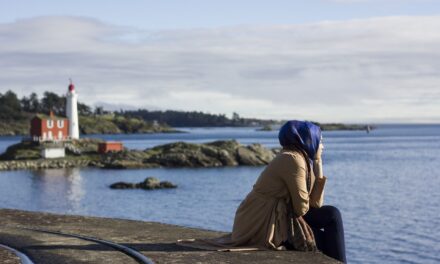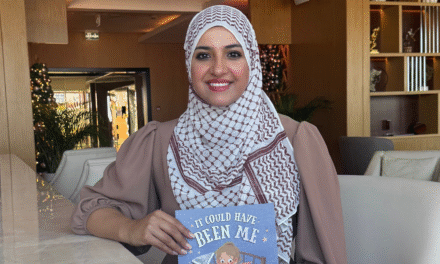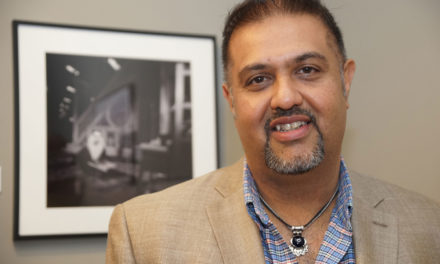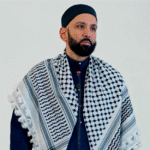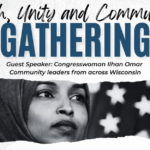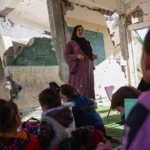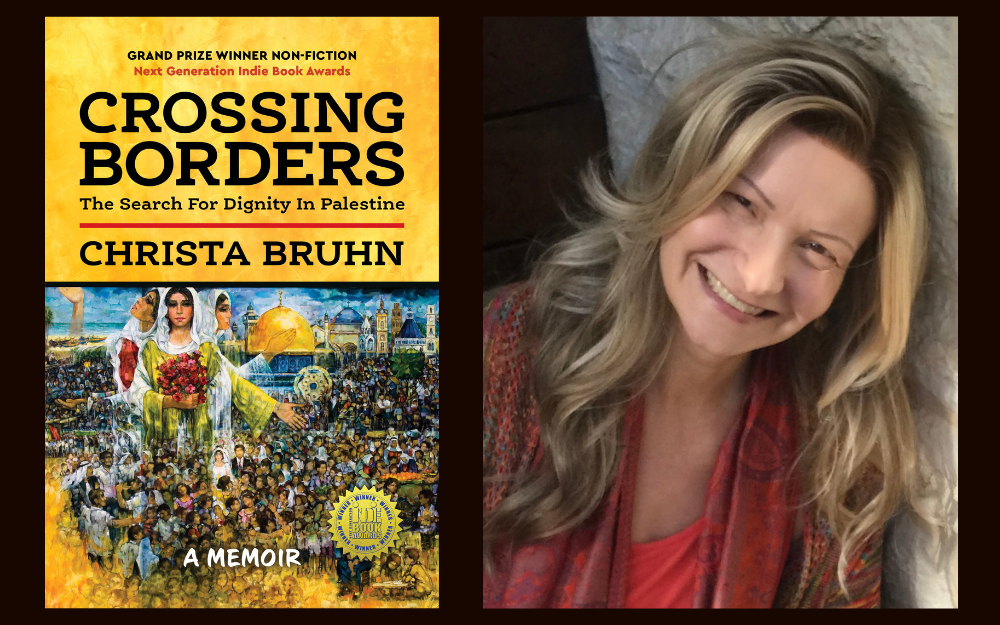
Photos courtesy of Christa Bruhn
As an American mother of three Palestinian children, Christa Bruhn has spent many years pursuing answers to vital questions concerning justice and liberation for the Palestinian people. Her 2023 book Crossing Borders: The Search for Dignity in Palestine follows Bruhn on her many journeys through Palestine and Israel, inviting readers to examine the disputed Holy Land from the lens of Palestinians fighting for their dignity and self-determination.
As a memoir told first-person in present tense, Crossing Borders: The Search for Dignity in Palestine explores answers regarding the Palestine-Israel question by way of historical and academic analyses, personal account, and humanization. Christa Bruhn chronicles her experiences of spending time with displaced Palestinians, visiting extended family in their villages, and navigating Israeli checkpoints.
“You follow me, and you see me ask these questions in real time,” Bruhn expands. “You see the hardships of our family and the challenges that I witness. I wonder about the Israelis and what they’re thinking as they stop and block the road and interrupt our day, or as they’re driving the bulldozers that are ripping up my family’s trees so that we never get to eat those olives and almonds.”
Bruhn organizes chapters of Crossing Borders by decades since the Nakba so that said tragedy cannot be ignored relative to Israeli independence. She recognizes, righteously, that Israel must end its systemic oppression of Palestinians and allow their right of return for there to truly be peace in the region.
“There were hundreds of Palestinian villages that were destroyed in what is now Israel,” Bruhn notes. “All of those place names do not exist on the map of Israel, even though every Palestinian from every one of those towns and villages can tell you its name and the date it was destroyed.”
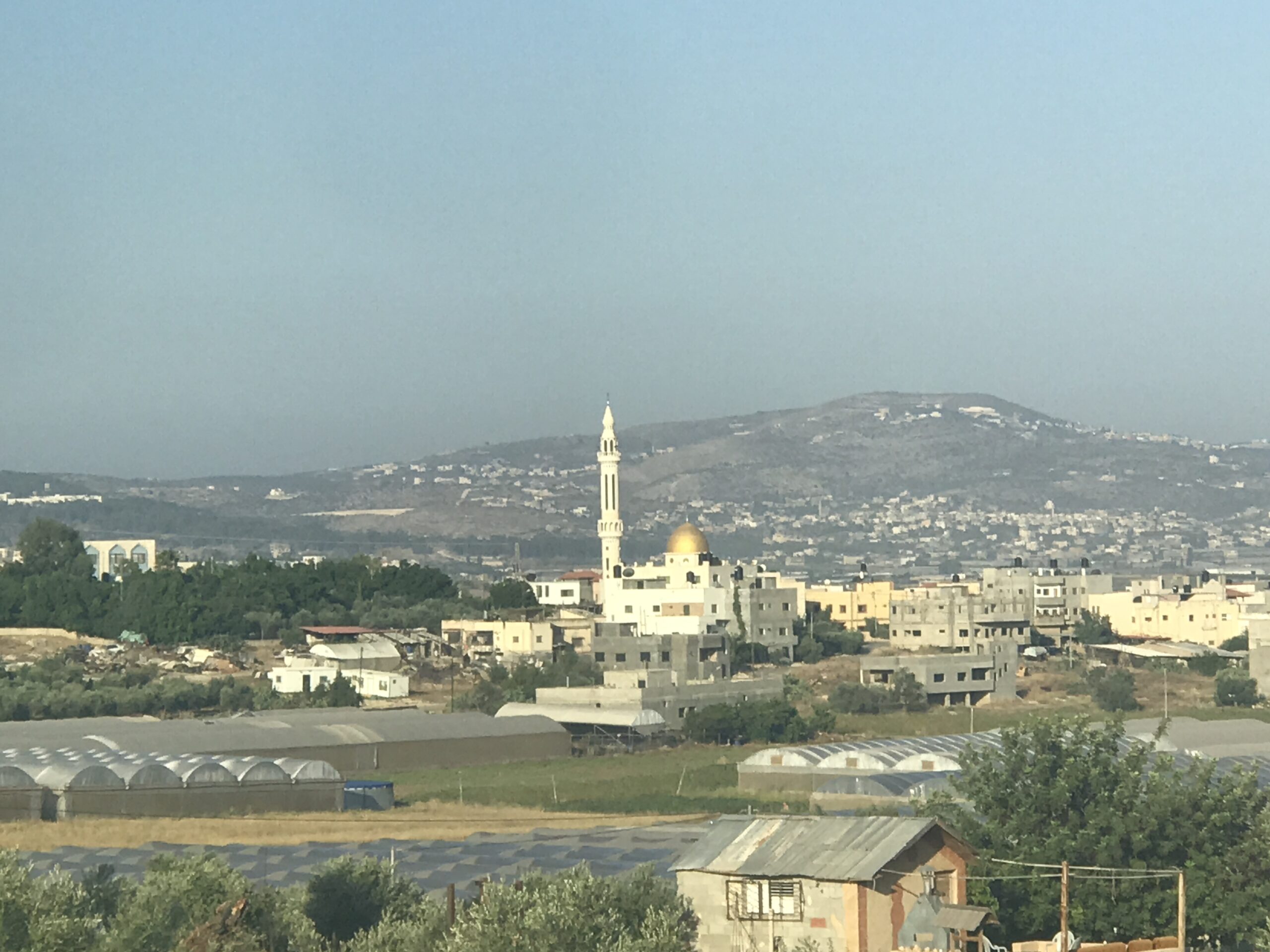
A landscape view of Jalameh, Palestine from the hills near the family home.
Inferred by the book’s title, Bruhn contemplates the political concept of borders, citing examples like the Apartheid fence and Israeli checkpoints, that are put in place by the powers that be as mechanisms of restriction. This vile subjugation of Palestinians in their own lands, or in “Israel’s shadow” as Bruhn describes, is nothing short of forced displacement, cultural erasure and ethnic cleansing. She affirms that traveling through Palestine evokes a palpable sense of yearning by the land for its Indigenous people to return.
“They are part of the land, they build with the land like our Frank Lloyd Wright architect here in Wisconsin,” Bruhn says of Palestinians. “Israel cuts through the land and defaces it in order to exist.”
When Bruhn studied abroad in Germany during college in the 1980’s, she befriended a Palestinian who invited her to join him in visiting his family in Gaza. She accepted, and during the same trip, Bruhn’s father connected her with a Jewish colleague who had just made aliyah and earned Israeli citizenship. Experiencing firsthand the contrast between Palestinian and Israeli ways of life proved eye-opening for Bruhn.
She reflects, “That was the biggest education in my life. This new, young family with two young children had housing and employment and language classes and a whole network of support, and they instantly had citizenship and rights that Israel afforded its Jewish citizens.
“The family in Gaza we visited were refugees from the city of Jaffa just up the coast, and they to this day are now all scattered and displaced in Gaza. The mother of the family had a very severe case of diabetes and she has now passed away, and the rest of the family is living in tents and they’re terrified. They want the world to just wake up and stop the death and destruction and complicity in this genocide.”
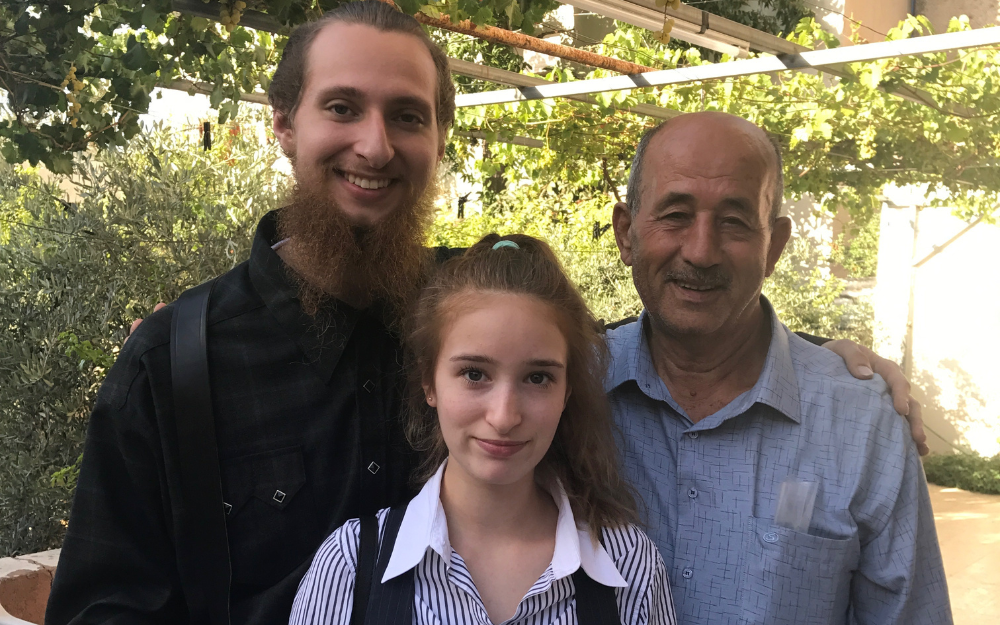
Christa’s children, Karmel (left) and Sham (middle) visiting their Great Uncle Khali Khalid’s house in the village of Burqin, Palestine.
Bruhn met another Palestinian man around the same time whom she eventually married, and they would have three children together. Since her undergraduate days in international studies through her masters in Middle Eastern & North African Studies, Bruhn has deepened her understanding of what would become her children’s father’s homeland while attending student demonstrations in support of Palestine and in protest of Apartheid in South Africa. She estimates that she has since traveled to the land over a dozen times, including to do her doctoral fieldwork on Palestinian universities in 2000 just before the Second Intifada.
Crossing Borders took Bruhn about a decade to write. The first chapters she wrote comprise what she characterizes as pivotal events. As she pieced vivid memories together, Bruhn realized that she was indirectly documenting the search for dignity in Palestine.
“The challenge is, the story’s not over,” she affirms. “The question of Palestine is still not answered. Nothing is changing. This occupation is the status quo.”
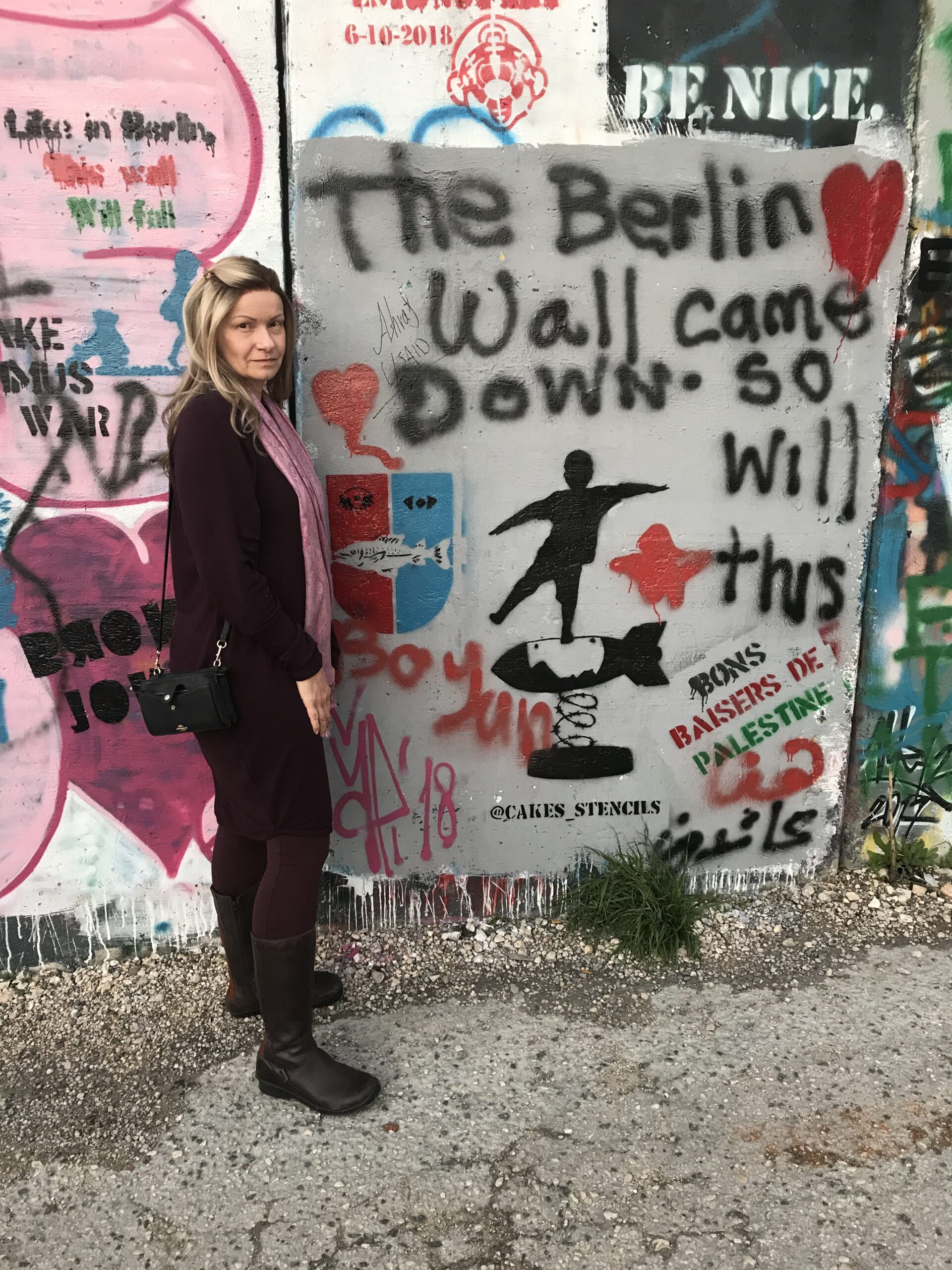
Graffiti on what Palestinians refer to as the “Apartheid Wall” in Bethlehem
Bruhn wrote Crossing Borders while privy to this horrifyingly unjust reality, best exemplified by the following excerpt from Chapter 35 titled “The Wall”:
“I don’t want to witness history, not like this. I lived to see the Berlin Wall come down, only to witness the Israeli Wall go up, right before my eyes. The weight of those concrete slabs presses down on my shoulders. I am as sad for the Israelis, who feel they need a wall to feel safe, as for the Palestinians, who have to live in its shadow. I am sad for my children, who will have to pass through this wall to see the rest of Palestine. I am sad for all the Palestinians already barred from returning to their villages, their fruit trees and olive groves, their treasured cities, the sea. The more Palestinians are confined, the less they can experience their homeland with their own eyes. Palestine becomes something only to imagine, to remember, to dream about, not to set foot on, live, and breathe. Even for those living in the West Bank and Gaza, or in areas that are now Israel, they are all limited to a piece, a corner, and left to imagine the rest. Their stories, their places, their connection to the land are left out of Israel’s history books. Is it still real? Palestine? If my daughter can tell her Sidi’s story of the last sesame harvest in 1948, isn’t it real?
But Bruhn also touches on her immersions into the spirit and joy of Palestinian culture and identity while there. In another passage, from Chapter 59 titled “Hidden Treasures,” she identifies the heartful rituals and sheer beauty of Palestinian agriculture.
“The sky is clear and bright, the air still cool and fresh as we walk between the olive trees. We admire all the special plants Nasser has arranged between the islands of ancient boulders protruding from beneath the earth. Flowering vines grow along the fence line that will soon create a wall of blossoms as a buffer from the packs of wild dogs that roam the hillsides. I recall how, years ago, we walked among these trees, the boulders islands of safety from the thorny brush. The only fences were the saber that marked the borders between each family’s share of the wa’ra. Now, just beyond Nasser’s wall of flowers, the Israeli border fence cuts the landscape between us and them. What will it take to erase these borders?”
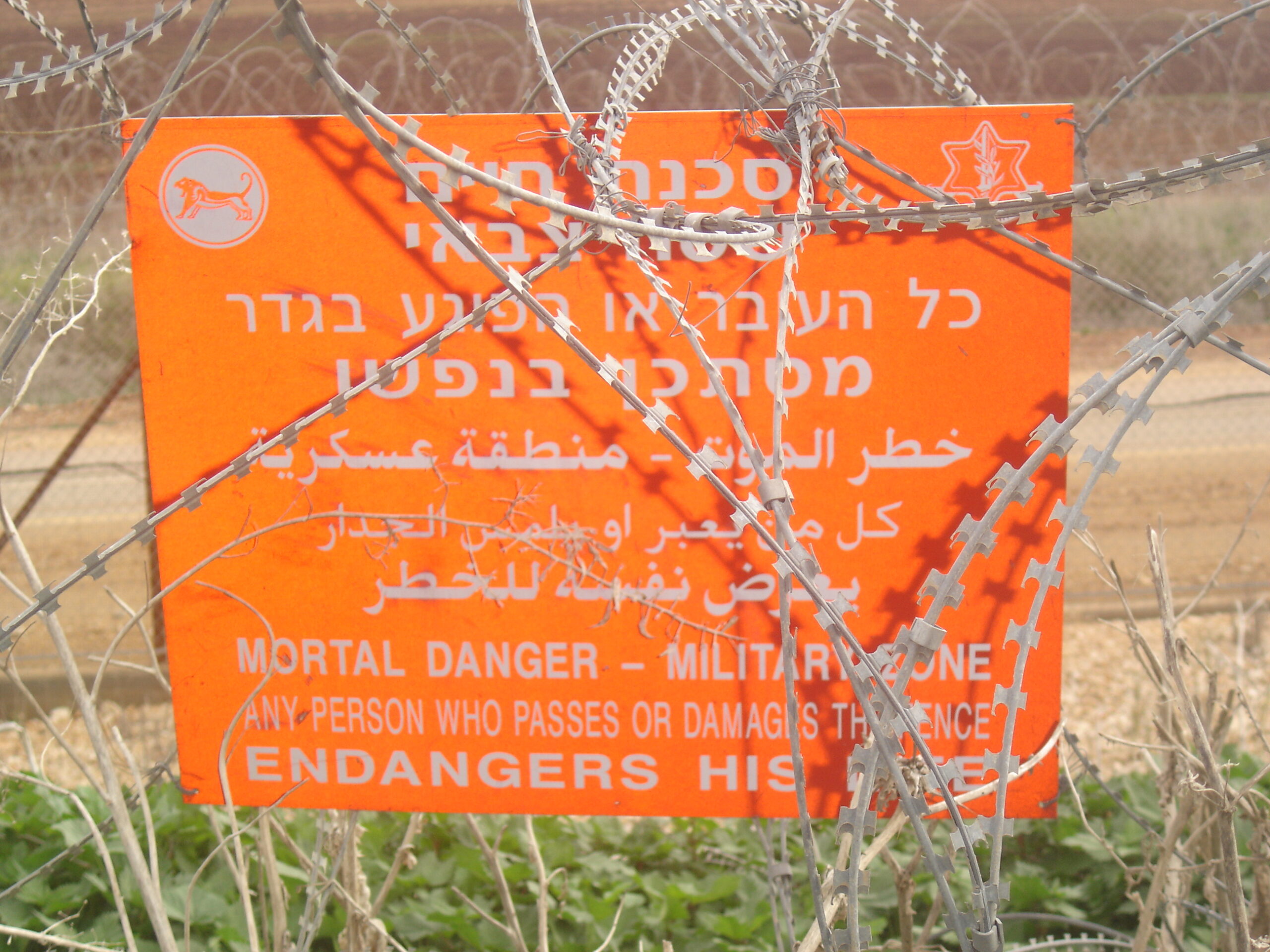
Israeli military sign posted at Apartheid fence near the family home in Jalameh, Palestine.
Crossing Borders: The Search For Dignity in Palestine was published in May 2023 by Little Creek Press of Mineral Point, Wisconsin. It has since received numerous awards and honorable mentions from independent book reviewers, and Bruhn has participated in a number of book talks for its promotion.
Although Crossing Borders came out before October 7 last year, when the Israeli genocide in Gaza unfolded, Bruhn feels that the message of the book echoes ever-so urgently since then.
“The situation on the ground did not start that day,” she elaborates. “Nothing changed other than an increased sense of urgency that I already had, which is what drove me to write the book and share my stories. It offers badly-needed historical context that some people unfortunately choose to ignore when talking about October 7, as horrific a day that it was.”
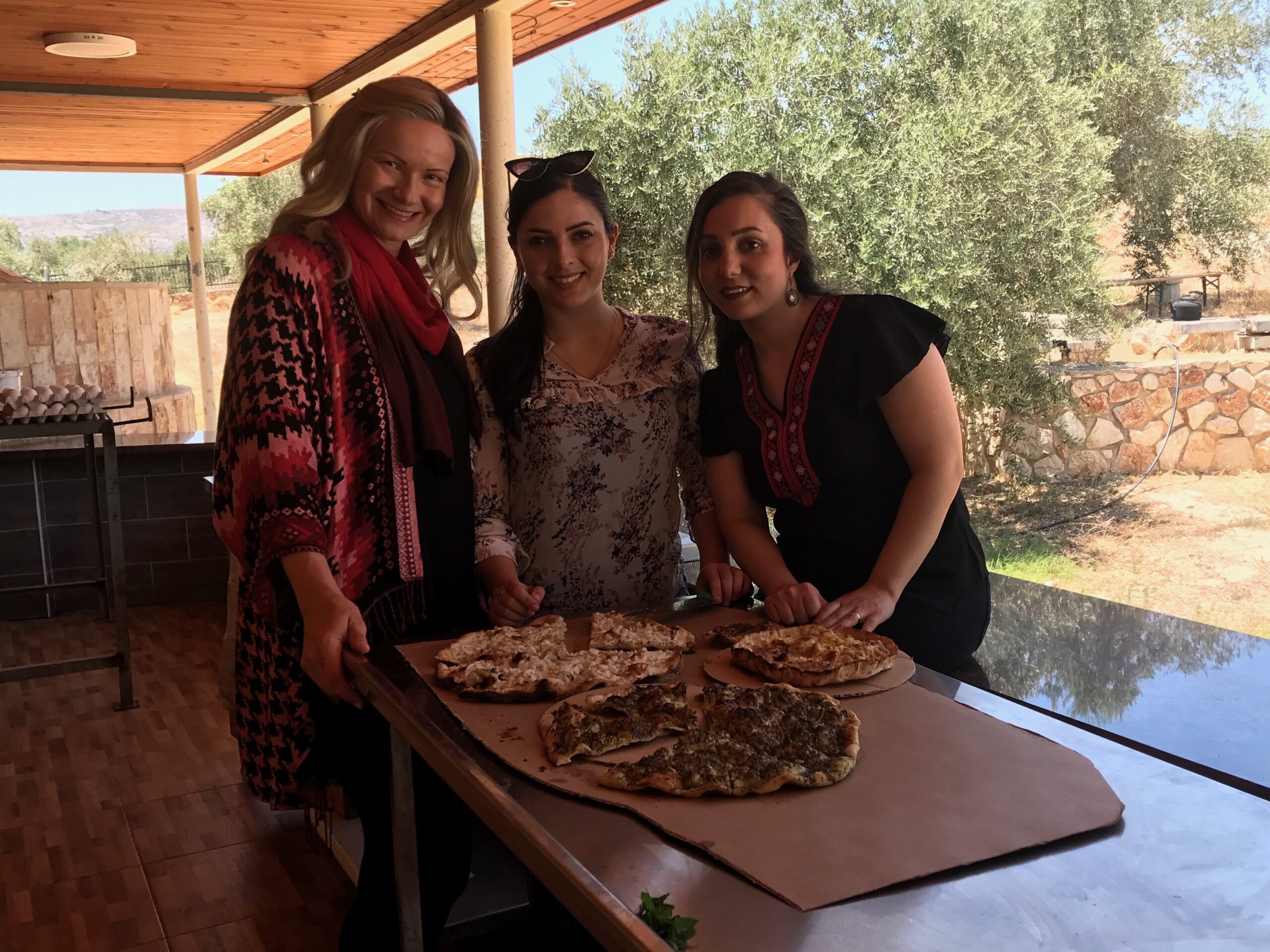
Left to right, Christa with employees, Fida and Wala at the Canaan Palestine family business facility in the village of Burqin, Palestine, enjoying freshly baked taboun bread made with landrace wheat topped with cheese, za’atar and eggs.
Here in the U.S., Bruhn’s children have the protections that our country’s citizens enjoy. But when they visit their father’s homeland in Palestine, they are subjects of the state of Israel, which understandably terrifies her.
“They don’t have the rights and privileges of ‘the only democracy in the Middle East’ that Israel claims to be,” Bruhn adds. “The differentiation between Palestinian communities that are on the land between the river and the sea, there’s like a caste system, and many Palestinians do not have access to their own land.”
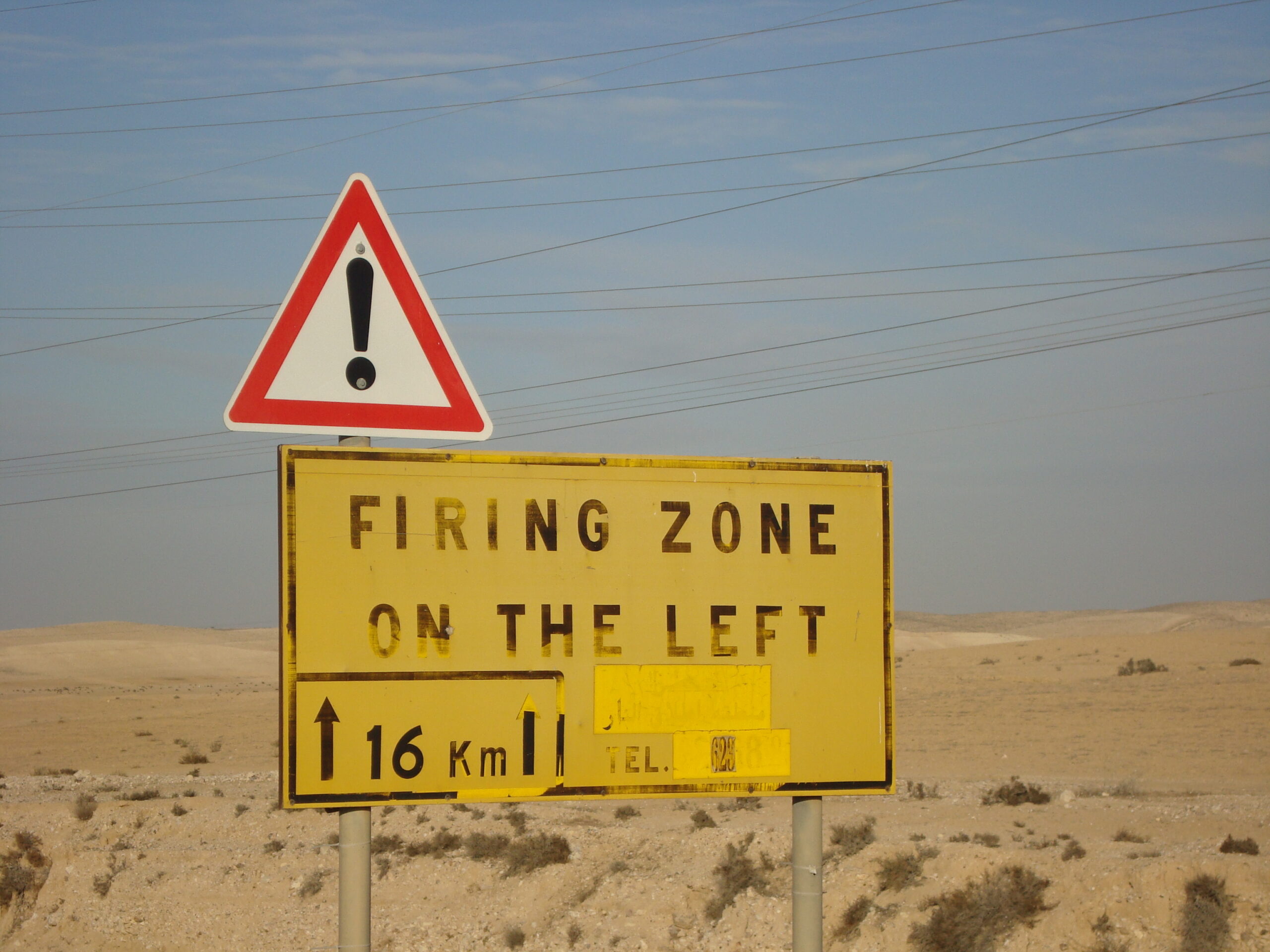
Israel has established ‘Firing Zones’ to restrict access of Palestinian Bedouin Arabs to their ancestral lands in the Negev Desert.
This reality puts Bruhn in a distressing dichotomy between standing up for what is right and protecting her family. To overcome that fear, she puts trust in humanity to come together and collectively speak out on the issue.
“We have to keep speaking out because we don’t have the luxury not to,” Bruhn concludes. “Palestinians are not just the people over there; they’re my children. I ride the wave of hope from other historical examples where change has been possible, like South Africa and the Berlin Wall.”
Christa Bruhn has been working on an audiobook version of Crossing Borders: The Search for Dignity in Palestine, which will be available this coming January. She has also focused on her poetry, which she plans to publish into a book next. To learn more about Christa Bruhn’s work, visit her website.
